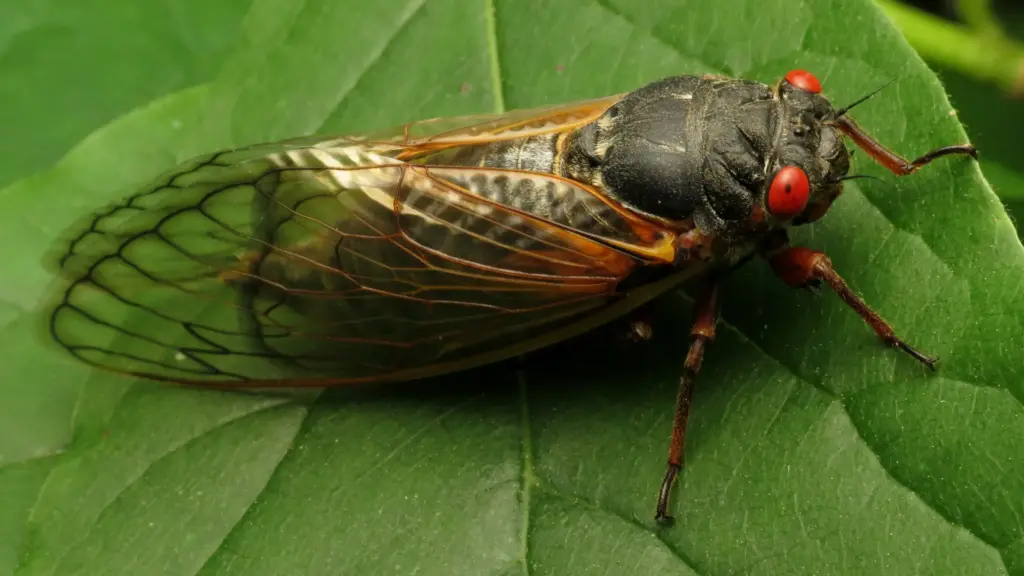Cicadas Make Music and Memories

By Karen Haave
I have a confession to make: I love the sound of the cicadas.
So many friends have said they hate the racket the little bugs make when they sing their love song in search of a mate.
But I find it captivating, the rhythmic rise and fall of their melody that we only hear every 17 years. It brings back memories of the first time I heard it, when I was 10 years old.
We lived in what then was very rural Homewood, in a poorly constructed wood frame house, surrounded by farm fields, with only a few other homes scattered on streets in the distance.
The back of the property was open and wide with garden plants, but the front was shaded by the thick canopy of seven huge, old Poplar trees.
It was there that the cicadas made themselves known. I read recently that it was a banner year for them. They were everywhere: on the tree trunks, on the grass, in the ditch near the road, occasionally in my hair.
My mother and her sisters called them locusts, and they hated the noise they made.
But I loved it. Even though I had already lost most of my hearing, with only about 25 percent remaining, the synchronized buzzing of thousands of cicadas was loud and clear.
In the evenings that summer, I would sit in the backyard with my mother, on an old metal glider, drifting slowly back and forth, asking her questions about her early years in West Virginia.
She told me she lived on a farm, that her father was hardworking, and her mother walked on water, apparently.
She was the second-oldest of 11, she said, and always called upon to help with the babies. On her report card one year, her teacher wrote, “Mary is a wonderful student, but she needs to be in school more.”
When something happened with the farm in 1929, the family moved to Chicago, where grandpa took a job with a railroad. I once asked what happened to the farm, and my mother became a bit irate. “Just mind your own knittin’,” she said.
Some things, she didn’t want to talk about.
That year, she became engaged to Bud, a man I never thought worthy of her. But she was a single mom, 43, struggling to raise seven kids, and she wanted to be married again.
One night she told me that Bud, who was 39, had taunted her, remarking that the next time the locusts came around, she would be dead, but he would still be alive.
A week later, after one of his customary nights of too much alcohol, he accidentally rolled his white Thunderbird convertible over and died.
But the next time the cicadas made an appearance, mom lived in a bigger, better house on a tree-lined street in North Harvey.
We would sit on the swing on the front porch, and with the cicadas harmonizing in the background, she would tell me about all the plants the previous owner, a botanist, had left in the gardens there. She loved the Burning Bush, the yellow roses, and the enormous lilacs.
She grew tired of the old Concord grapevine, though, and dug it up to throw it away. I took it home to my own backyard and much to my surprise, it thrived the following year, with baskets full of sweet, purple grapes. The grapes attracted what seemed to be millions of hateful Yellow Jackets, but that’s another story for another day.
Anyway, by then I was a young, single mom embarking on a journalism career and still asking questions, some of which my mother still did not want to answer. She died six years later, and even after all that time, Bud’s cruel comment came to mind.
In 1990, we lived in a subdivision that had been cornfields for many decades, and the newly planted trees were too young to have any history with cicadas. Their visit didn’t seem to reach us that time.
The trees had flourished by 2007 and might have played host to some cicadas, but alas, most had been cut down and removed because of Asian Beetle infestations and Dutch Elm disease.
The same thing happened a few years later in Monee, and with those century-old trees gone, we’re not getting much cicada music where I live. And that makes me a bit melancholy, because it seems unlikely that I will still be here in 2041 for the next generation of the ugly little critters. This realization is not meant to be maudlin, but comes to me after yet another loss of a loved one who was younger than I, in a year when there already have been many other losses.
I might still be here in 2041, of course, but just in case, I plan to go out in search of a cicada-rich location where I can sit for a little while and listen to their cacophony before they leave us again.
You know, for old time’s sake.
Karen Haave is a freelance reporter.
